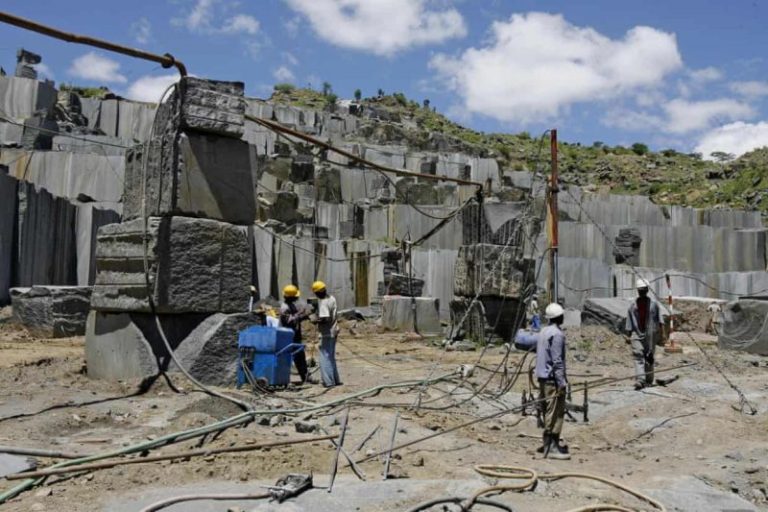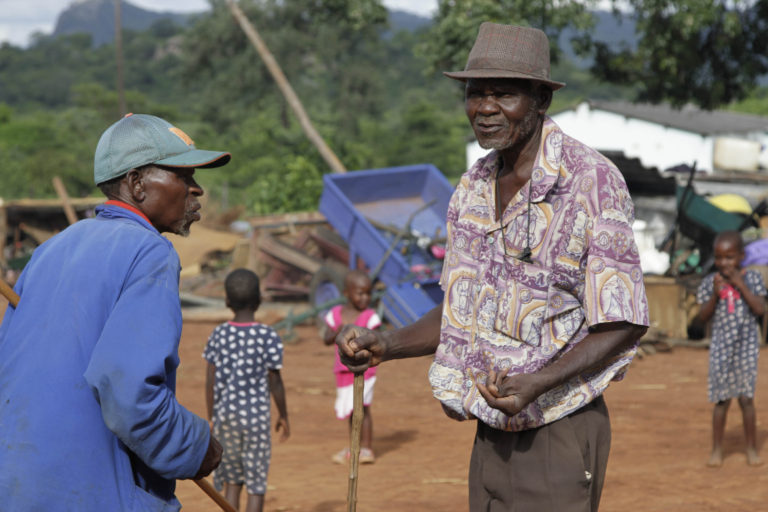For Claudious Murungweni (not his real name), a 35-year-old bus conductor plying the Zimbabwe-South Africa cross-border route, the corruption and smuggling of a low base mineral has turned around his economic fortunes.
From a paltry equivalent of US$90 dollars as a monthly salary, Murungweni now has a new avenue that is financing his livelihood running into thousands of US dollars.
Since October 2021 when the government relaxed the COVID-19 pandemic restrictions that enabled cross-border buses to carry passengers, Murungweni says he has been approached by “good guys with great deals.”
“I carry raw granite stone slabs cut from the main blocks. These black granite slabs are movable by bus so for that job we get ZAR25 000 rand (US$1 600). First transaction is just a fifty percent deposit that I use to pay (bribe) the police and revenue collection officials at the Beitbridge border post.
“When we get to South Africa that is when I am paid the balance,” says Murungweni.
For the trip, Murungweni shares the money with the bus driver, and also bribes Zimbabwe Revenue Authority (Zimra) officials at the Beitbridge border post and their South African counterparts.
Zimbabwe is a country richly endowed with useful diverse mineral resources. Despite this vast mineral resource base, more attention has been placed on highly valued minerals like gold and diamonds when people talk of smuggling.
The illicit financial flow in the mining sector according to the government through Home Affairs minister Kazembe Kazembe costs the state US$100 million each month in lost revenues, a total of US$1.2 billion annually.
The issue of illicit financial flows affecting Zimbabwe’s struggling economy has moved from highly precious minerals like gold to low minerals like the granite stone, now known as “the black gold.”
From where the granite stone is mined by the Chinese, in Mutoko, a rural area about 140 kilometers east of the capital Harare, villagers have little to show off the mineral mined in their area, except bearing the brunt of environmental damage.

A 2019 investigation conducted by ZELA on the financial and social impact of black granite mining in Mutoko revealed that less than ten percent of Zimbabwe’s granite is cut and polished locally with the bulk of it being exported in its raw form as “granite merely cut into blocks.”
Because issues of smuggling are not treated with precision in courts, a close associate to the country’s President Emmerson Mnangagwa, Ms. Henrietta Rushwaya, was in October 2020 intercepted at the Robert Gabriel Mugabe International airport with six kilogrammes of gold worth an estimated US$366,000 in her handbag en-route to the United Arab Emirates.
She was arrested, spent days in prison and later released from custody in January 2021 on ZWL$100 000 bond. However, her case is now collapsing after anti-corruption advocates hinted that the way her case is progressing has been engineered to collapse because of her close links to the Mnangagwa family.
“If I get arrested I will just know I am a small fish, and those heavily involved in smuggling are walking scot-free. That means our system has broken down and people can just do all they can to earn a living. I do not even ask where the granite stone is going,” adds Murungweni.
According to Shamiso Mtisi, the spokesperson of the Zimbabwe Environmental Lawyers Association (ZELA), from where the black granite is mined “environmental damage and lack of community benefits for the people of Mutoko” are key characteristics.
“We hear there are issues of the smuggling of the black granite stone from Zimbabwe specifically because of its fineness and being a great quality mineral. Unfortunately, there is a failure to have it benefit the communities from where it is mined.
“What is procedural is to have granite exported through formal procedures by going to the Minerals Marketing Cooperation of Zimbabwe (MMCZ), but the money that these mining companies pay as a mining levy is inadequate. Those levies deny the communities opportunities for development,” said Mtisi.
Export cumulative figures by the Zimbabwe Statistics Agency (Zimstat) revealed that in 2020 Mozambique, Zambia, South Africa, Italy, Switzerland, China, Greece and Spain are among the top export destinations of unbeneficiated granite.

Mutoko is not an exception regarding general environmental, economic and social challenges resulting from the mining of black granite.
To curb smuggling syndicates and plug illicit financial flows, the Zimra border controls say the upgrading of the Beitbridge Border post into a “world class” center is one that will help break the stranglehold of smuggling syndicates.
Zimra head of corporate communications Francis Chimanda says the authority is working to improve security to reduce instances of smuggling by improving the bus terminal that will see all travellers.
“The new bus terminal (at the border) will provide facilities where all buses will have their goods offloaded and checked before authority to proceed will be granted by revenue officers through scanning of gate passes to activate the opening of boom gates.
“This will go a long way in ensuring that the buses are checked and authority to proceed is granted. The upgrade will also generally improve security and reduce instances of smuggling at the Beitbridge border post as the new measure for traffic control and movement have improved the checks and balances,” Chimanda says.
Chimanda also pointed out that Zimra officials have embarked on random searches of buses to break the smuggling syndicates but they have not intercepted any with black granite stone.
“Currently random searches are being done on exit buses and to date, no interceptions have been made on granite being smuggled. Having said that any instances of possible smuggling will be thoroughly investigated” Chimanda adds.
Zimbabwe Miners Federation (ZMF) spokesperson Dosman Mangisi says as long as government and policymakers in Zimbabwe do not come up with a Minerals and Metals Beneficiation policy, the country’s minerals will continue to be smuggled out.
He says the value of beneficiation should be explained to the communities where the minerals are being mined in order to empower locals.
“Basically we are lagging behind as a country because Zimbabwe has no legal and policy instruments that enable value addition of our minerals. We have no metal beneficiation laws.
“Our principals should come with beneficiation policy frameworks that govern this. The ones we have speak of mining on a touch-here-touch-there basis,” Mangisi says.
For example, sample surveys conducted by the ZMF since 2016 have concluded that Zimbabwe is sitting on US$30 billion worth of iron ore but the country is currently importing 70 percent of its iron requirements.
“For this country to unlock value, granite beneficiation should be done at community level through a formulated Minerals and Metals Beneficiation policy. These minerals should therefore be classified so that we know their uses and value.
“As long as we do not have beneficiation policies we will never know the value of what we have,” adds Mangisi.
He also urged the government to start beneficiation awareness campaigns at community level so that locals know what value their minerals have.




















